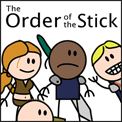Non-Transitive Dice
So I'm doing a little reasearch on bgdf for my dice game, and a kindly user named doho123 posted a link to a cool article at ScienceNews.org about non-transitive dice.
It's about breaking the mathematical concept of transitivity. The transitive property describes how we can infer relationships between mathematical entities. For example, if I tell you that A = B and B = C, you can infer that A = C because of the transitive property of equality. Likewise, if I tell you that A < B, and B < C, then you can likewise infer that A < C by the transitive property of inequality.
The same concepts can be applied to game theory. If we have three dice, and die "A" beats die "B", and "B" beats die "C", then we would expect die "A" to beat die "C" as well. This is not always the case. The article explains that you can engineer your probabilities such that "A" beats "B", "B" beats "C", and "C" beats "A". This gives you a Rock/Paper/Scissors effect: each element loses to one element and wins over another. This is the sort of elegant system that makes a game balance itself, and so designers should search for ways to engineer non-transitive relationships between competing elements.

 RSS
RSS

